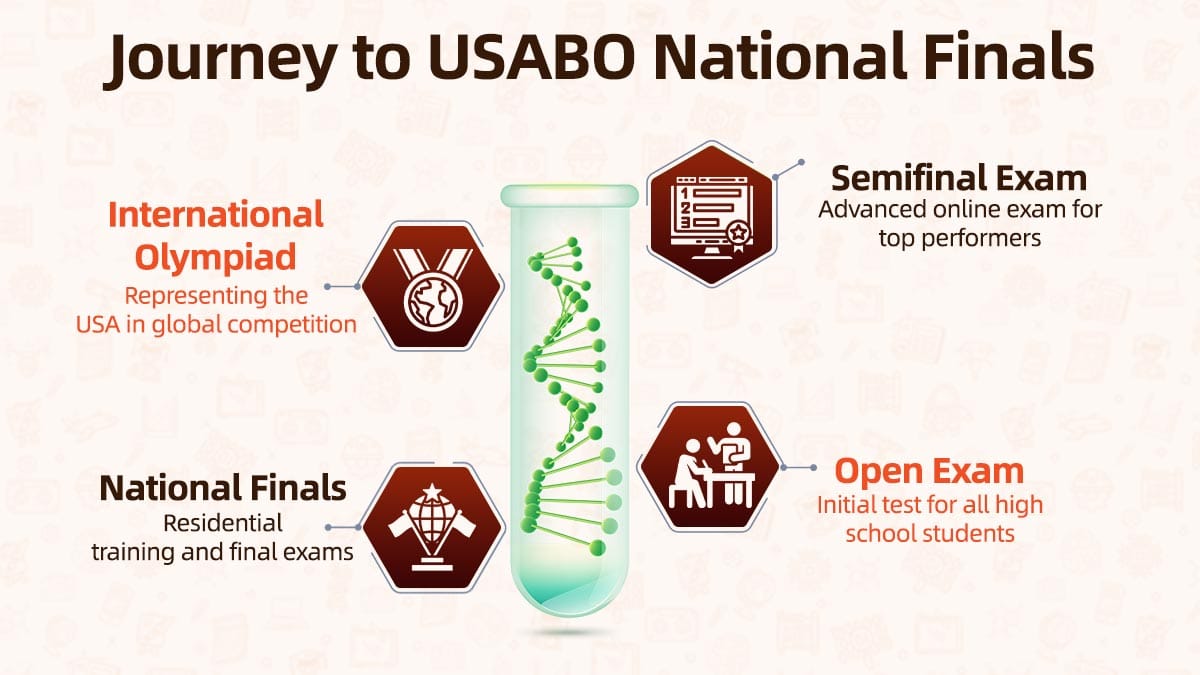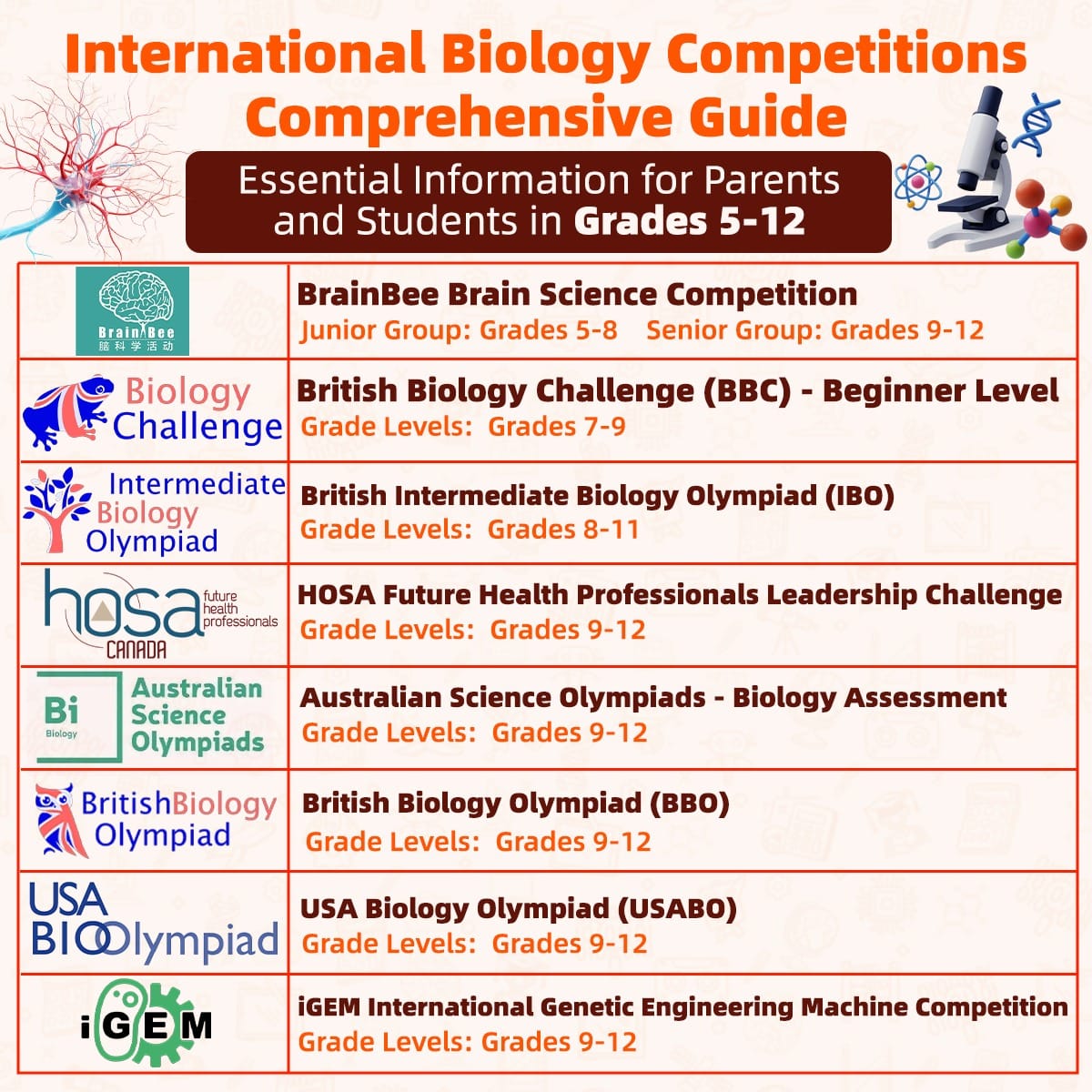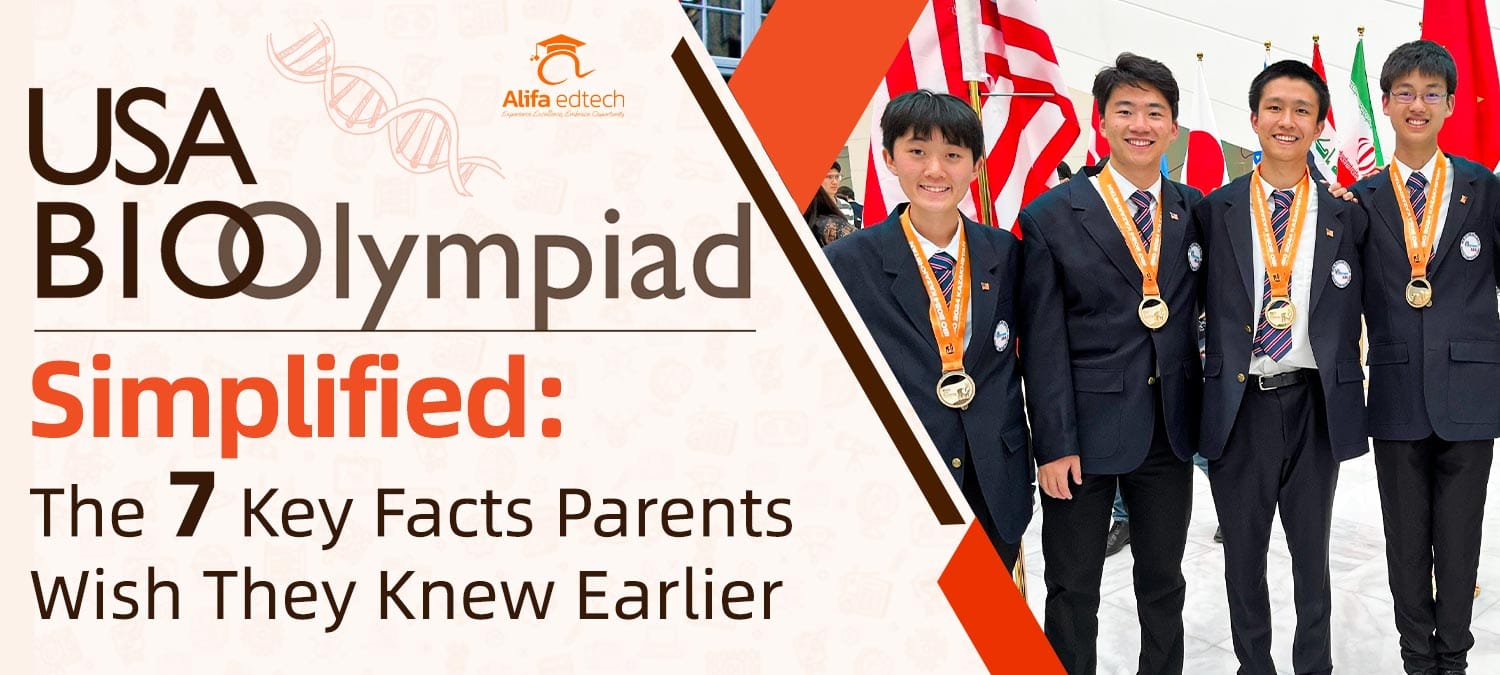Introduction
The USA Biology Olympiad is a top-tier biology competition for U.S. high school students. Each year, almost 10,000 bright students take on this tough exam series. Many parents discover USABO too late. Others lack key information that could help their children succeed.
Most families learn about this competition through school announcements or friends. By then, other students have started preparing months ahead. Some parents assume any strong biology student can jump in and compete well. Others don't know about the time commitment needed for good preparation.
The Centre for Excellence in Education runs this national competition. It enriches life science education across the country. Students develop critical thinking skills. They explore advanced biological concepts. The journey can lead top performers all the way to Team USA at the International Biology Olympiad. These seven key facts give your students a better chance to excel from the start.
Give your child a winning edge in the USABO. Get proven study strategies, past paper coaching, and personalized preparation support for parents and students. Book a free consultation with ALIFA Education Services today.
Key Fact 1: Citizenship requirements are stricter than you think

All high school students in grades 9 to 12 can take the Open Exam. Citizenship status doesn't matter for this first round. This open approach welcomes everyone interested in testing their biology knowledge. Many parents assume this openness continues through all competition levels.
Citizenship requirements become much stricter for advanced rounds. Students need U.S. citizenship or green cards to progress to the Semifinal Exam. This rule stops international students without proper papers from advancing past the first round. Parents of international students should know this limit before investing a lot of preparation time.
Home-schooled students can also take part in USABO. They must arrange to take the exam at a registered high school in their local area. These arrangements need to be done before registration closes. Parents should contact nearby schools early. This secures testing locations for their home-schooled children.
Age limits also apply for the USABO National Finals. Students must be at least 15 years old as of January 1, 2025. They also cannot turn 19 before July 31, 2025. High school seniors can take part. But they must not enrol in any undergraduate programme at a university or college. These specific requirements catch many families by surprise.
To learn more about the services offered by Alifa Education, please visit our dedicated page. Whether you are a guardian, affiliated with an international or bilingual school in China, or a study abroad education agency, Alifa Edtech offers services tailored to your unique needs. Please visit our page to learn more about our offerings.
Key Fact 2: It's a three-stage marathon, not a single sprint.
USABO uses a three-tier system. Each level gets harder. Many parents think it's just one test. The competition structure is far more complex. Knowing this early helps families plan the right preparation timelines.
The competition begins in February with the Open Exam. This first round tests basic knowledge across all biology topics. Every registered high school student can take this 50-minute exam at their school. The exam covers Cell Biology, Genetics, and Evolution. It also includes animal anatomy, plant anatomy, and other core biological concepts.
The top 10 percent of Open Exam takers advance to the Semifinal round. About 600 students get invitations to this 120-minute online exam. The Semifinal Exam has three sections. These test a deeper grasp of biological concepts. Part A has multiple-choice questions. Other sections include Short Answer questions that need detailed responses. This round demands strong problem-solving skills and a deep understanding.
Twenty students reach the USABO National Finals. Selection is based on Semifinal Exam scores. These finalists attend a residential training programme. They learn advanced biological concepts and lab skills there. The programme runs for about 10 days at a host university campus. Students work with university professors and research experts during this intense period.
The National Finals include both a theory examination and a practical examination. These tests check understanding and lab skills. Students work with lab equipment. They show their ability to conduct experiments. The top four finalists form Team USA. They represent the United States at the International Biology Olympiad.
Key Fact 3: Registration happens through schools, not alone.
Most parents do not know they cannot just register their child online. This isn't like other competitions. Schools must register as official testing sites for the Open Exam. This process needs coordination with biology teachers or school leaders.
The registration fee is about $100 per school. This covers all student takers regardless of number. Some schools cover this cost. Others ask students to chip in. Parents should clarify payment expectations with their school early. Registration deadlines fall in late January. Families must act fast after winter break.
Home-schooled students face extra logistics. They may need to pay $125 if testing at a host school. Parents must contact multiple schools to find one willing to host their child. These arrangements take several weeks to finalise. Starting this process in December ensures everything is ready before registration closes.
Some schools don't take part in USABO at all. Parents at these schools must advocate for their students' participation. Approach science department heads with information about the competition's benefits. Schools like John P Stevens High School have built strong USABO programmes. These programmes elevate their entire science curriculum. Your advocacy could establish a lasting programme. It would benefit future students too.
Want to put your brand in front of families, students, and education-focused readers? We're inviting select partners to advertise with us on our trusted blog.
Want to get featured? Click 'Learn more' and submit a story for us to include.
Key Fact 4: Campbell Biology is your Bible, but it's not enough
Campbell Biology serves as the main textbook for most USABO competitors. This wide resource covers all major topics tested in the Open Exam. Students who know Campbell Biology well perform well in the first round. But this 1,000-page textbook scares many students and parents.
Breaking the reading into small sections helps. Students should avoid feeling overwhelmed. Aim to finish one chapter every two to three days. Don't cram everything in at once. Students should take AP Biology courses or honours Biology. These build their foundation alongside solo study. The courses provide structured learning of core biological concepts.
Practice problems help students apply their knowledge under test conditions. The USABO website offers past papers. These show the exam format and question styles. Working through these papers reveals knowledge gaps. It also builds problem-solving skills. Students should time themselves. This mimics actual exam conditions.
Extra resources boost learning beyond textbooks. Macmillan Learning offers tutorials on various biology topics. YouTube tutorials provide visual explanations of complex processes like molecular biology. A flashcard database helps students memorise key terms and definitions. Art of Problem Solving forums also help. They connect students preparing for biology competitions across the nation.
Advanced students aiming for semifinals need deeper knowledge. They should study molecular biology and cell biology in greater detail. Genetics and evolution also needs more focus. Topics like data interpretation and lab training become more important at higher levels. Study groups provide valuable support. Student teams work together on difficult material. They share strategic insights with each other.
Key Fact 5: The time commitment rivals a part-time job.
Good USABO preparation needs 8-12 hours weekly for several months. This commitment surprises parents. Many assume a few weeks of studying is enough. Students must balance USABO preparation with schoolwork. They also have other activities and family time.
Creating a structured study schedule ensures steady progress. Dedicate specific hours each week to USABO preparation. Don't study at random times. Many students study during the weekends. Others dedicate one hour each weekday evening. The key is being consistent. Avoid long cramming sessions before the exam.
Students who reach the National Finals face an even bigger commitment. The residential training programme runs for about 10 days in June. This timing often clashes with final exams. It may also overlap with graduation ceremonies or family vacations. Students can take a 24-hour leave to return home if needed. But missing training hurts performance in the final exams.
Lab experience also needs a time investment. Not all schools offer extensive hands-on biology labs. Students should seek extra lab opportunities. Summer programmes or Science Olympiad can help. Even basic know-how with lab equipment and procedures helps during the practical examination. This preparation cannot happen in a few days.
Parents should discuss this commitment with their student before starting USABO preparation. Some students handle the workload with ease. Others struggle with it. An honest review of your student's schedule and stress tolerance prevents burnout. Students should view USABO as a marathon. It needs steady effort rather than a sprint.
Key Fact 6: The college application benefits are exceptional.
USABO participation offers big advantages for college applications. Becoming a Semifinalist puts students in the top 600 biology students in the country. This achievement shows dedication and passion. It shows excellence in science. College admissions officers view USABO success as a Tier 1 or Tier 2 activity.
Even taking part in the Open Exam shows initiative in biology education. Students can list this involvement on applications alongside their scores. Those who advance to the semifinals gain a major edge. Top universities seek students with strong performance in national competitions like USABO.
The competition develops problem-solving skills. These extend beyond biology. Students learn to analyse complex questions. They synthesise information fast. They practise working under pressure and managing time well. These critical thinking skills benefit students in all academic areas. They help in future careers too.
Lab skills gained through USABO preparation prove priceless for science majors. Students who reach the National Finals receive intense lab training from experts. They learn proper techniques for handling lab equipment. They also learn to conduct experiments the right way. This hands-on experience gives them an edge in college lab courses.
USABO alumni often pursue careers in biological research and medicine. The competition connects students with professors and researchers in their field of interest. These networking opportunities can lead to research positions. They also create mentorship relationships. Many finalists attend top universities. They become leaders in science and technology fields.
Key Fact 7: Starting early makes all the difference.
The biggest regret parents share is finding USABO too late. Students who begin preparation in their first or second year have big advantages. They can take the Open Exam multiple times. This gains them experience and confidence. Each attempt teaches valuable lessons about question styles and time management.
Early preparation also allows students to build knowledge bit by bit. Learning Campbell Biology over two years feels doable. Cramming it in three months does not. Students can take Honors Biology as freshmen. Then AP Biology as sophomores. After that, they focus on advanced topics as juniors. This path creates a strong foundation.
Starting early reduces stress and pressure on students. They can explore biology topics at a comfortable pace. They maintain balance with other activities. Last-minute preparation often leads to burnout. It creates poor results. Students who start early enjoy learning the material. They don't view it as a burden.
Freshman and sophomore participants gain valuable exposure. This happens even if they don't advance far. They learn what topics need more attention. They can adjust their study plans as needed. By junior year, these students compete with confidence and refined strategies. Many semifinalists and finalists took the Open Exam two or more times to get their best results.
Parents should introduce USABO to their students in eighth or ninth grade. Students don't need to compete right away. They can begin building relevant knowledge early. Encourage enrollment in rigorous biology courses. Support exploration of life science topics. This early foundation makes serious USABO preparation much more doable later.
Conclusion

Knowing these seven key facts helps parents support their children well in USABO. The competition offers great opportunities for students passionate about biology. But success needs early planning. It needs consistent effort and smart preparation.
The benefits extend far beyond competition results. Students develop problem-solving skills and lab expertise. They build deep understanding that serves them throughout their careers. They join a community of motivated peers. They connect with expert mentors in biological sciences. Whether students reach the semifinals or National Finals, the journey builds valuable skills.
Parents should encourage interested students to start USABO preparation early. Begin with the Open Exam to experience the competition format. Success at any level shows academic excellence. It shows commitment to biology education. The journey opens doors to future opportunities in science and medicine.
Alifa Education services gives your child a winning edge in the USABO. Get proven study strategies, past paper coaching, and personalised preparation support for parents and students. Book a free consultation today.







Member comments